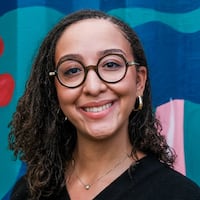Barbara Jones-Brown is the personification of all the things Atlanta does right – and wrong – when it comes to supporting Black women founders.
She is the founder and CEO of the loss prevention software startup Freeing Returns, which was born out of a program run by a technology incubator at Georgia Tech. In 2018, Jones-Brown participated in a hackathon to code a retail technology solution for a client in 48 hours and won the competition by creating what would eventually become Freeing Returns.
In 2020, she officially launched Freeing Returns, but has since faced obstacles in trying to raise capital.
“I think the education part, I believe that Atlanta has done a great job,” Jones-Brown said. “But when it comes to the funding part of it, that’s where I feel like we still have a challenge in Atlanta.”
Jones-Brown spoke to The Atlanta Journal-Constitution in between meetings at Google’s headquarters in Mountain View, California, where she was participating in a program for startup founders. In Silicon Valley, she said founders are funded by local investors and given contracting opportunities with local heavyweights like Meta and Salesforce — as an example Atlanta should emulate.
“People who are here, you know, they’re able to build and thrive and I feel like Atlanta could also be the same, especially for Black women founders. Come on, what better place than Atlanta?” she said.
It is a question echoed in a new report from Sage, a finance, HR and payroll software company, and The BOSS Network, a digital career development platform for women of color. The report, Voices of Strength: Pathways to Success for Black Women Founders, surveyed 40 Black businesswomen in metro Atlanta about their challenges and outlooks on their companies. Jones-Brown was not part of the study.
The report looked at Atlanta partly because the region has the highest rate of Black entrepreneurship in the country: 7.4% of businesses are owned by African Americans, according to a report from online loan marketplace LendingTree. Nationally, 2.4% of employer businesses are Black-owned, an Atlanta Journal-Constitution analysis of census data shows.
And looking at just the city of Atlanta, the rate of Black businesses is a lot higher: about 20% of the city’s businesses are Black-owned, according to economic development authority Invest Atlanta.
Black women business owners are also a fast-growing demographic of entrepreneurs. Between 2017 and 2020, the number of employer businesses owned by Black women grew by more than 18%, outpacing the growth of women-owned businesses and Black-owned businesses, according to a Brookings report.
The Voices of Strength report breaks down Black women founders into three categories with different challenges: Navigators, Maintainers and Thrivers.
Navigators are often facing significant challenges like unstable cash flow and an uncertainty in how to grow their business. Maintainers may also be facing issues with revenue but have some outside mentors and at least a short-term growth plan to help them adapt to challenges. Thrivers have stable cash flow, formal mentors and long-term strategic plans, but need help learning how to sustain their success.
The report uses the three categories to show that Black women founders are not a monolith and providing effective solutions to their challenges requires tailored support at each stage, including catered mentorship, community development initiatives and improved financial access.
Specifically, metro Atlanta businesses should be more intentional in providing resources to Black-women founders, the report said. It cites examples from Michael Baptiste, vice president of diversity, equity & inclusion at the Metro Atlanta Chamber, who said established businesses could increase access to capital for Black women-owned businesses. Organizations could also work with Black-owned banks, venture capitalists and other potential investors to fund Black founders and entrepreneurs.
The study garnered attention from high-profile Georgia leaders, like Sens. Raphael Warnock and Jon Ossoff. At the launch event for the report, they each spoke on video about the importance of supporting Black women entrepreneurs.
“I’ve seen firsthand how Georgia’s economy has changed over time,” Warnock said. “But in that growth, we have yet to see Black female entrepreneurs share a proportional part of this economic boom. There is much territory yet to be gained.”
The report comes as that support is being targeted by conservative groups like the American Alliance for Equal Rights, which has sued the Atlanta-based Fearless Fund for providing $20,000 small business grants to Black women, alleging the program is racially discriminatory.
Steve Hare, CEO of Sage, said his company’s inclusion efforts were not being swayed by the increased targeting of diversity efforts. Sage, based in England and publicly traded on the London Stock Exchange, has its North America headquarters in Atlanta. Next year the company is slated to move into the top two floors of the timber frame office building that is currently under construction at Ponce City Market.
“What we’re trying to do is create a level playing field, we’re not trying to swing it in favor of anyone,” Hare said. But there is also a business incentive for Sage in supporting Black women entrepreneurs – its efforts can create more small and medium-sized businesses, and Sage can sell its software to them.
The Atlanta Journal-Constitution and Report for America are partnering to add more journalists to cover topics important to our community. Please help us fund this important work at ajc.com/give
About the Author
Keep Reading
The Latest
Featured



